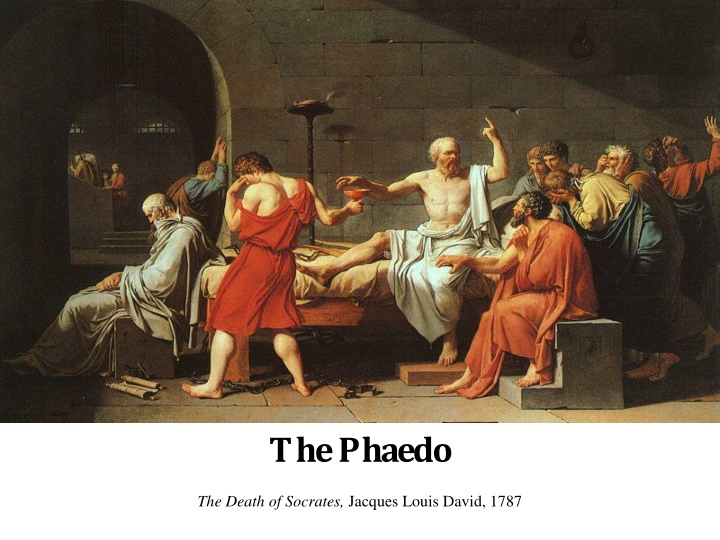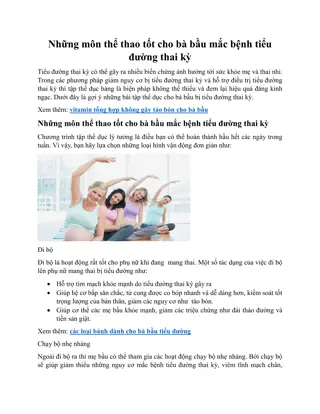
Philosophy in Plato's Phaedo: Preparation for Death and Pursuit of Knowledge
Explore the philosophical themes in Plato's Phaedo, including the concept of death as a reward for philosophers, the acquisition of knowledge, and the immortality of the soul. Dive into Plato's metaphysics, epistemology, and ethics as revealed through Socrates' dialogues, shedding light on the essence of philosophy as a journey towards wisdom and enlightenment.
Download Presentation

Please find below an Image/Link to download the presentation.
The content on the website is provided AS IS for your information and personal use only. It may not be sold, licensed, or shared on other websites without obtaining consent from the author. If you encounter any issues during the download, it is possible that the publisher has removed the file from their server.
You are allowed to download the files provided on this website for personal or commercial use, subject to the condition that they are used lawfully. All files are the property of their respective owners.
The content on the website is provided AS IS for your information and personal use only. It may not be sold, licensed, or shared on other websites without obtaining consent from the author.
E N D
Presentation Transcript
The Phaedo The Death of Socrates, Jacques Louis David, 1787
A Middle Period dialogue: Socrates is a mouthpiece for Platos philosophy The dialogue thus reveals much about Plato s philosophy, his conception of philosophy, his metaphysics, epistemology as well as his ethics. Philosophy is here explicitly conceived as a preparation for death how does a philosophical life serve as a preparation for death? Why does Socrates describe death as a reward for the philosopher? Plato s metaphysics: here we find a basic outline of Plato s Theory of Forms, his distinction between two levels or realms of reality the Sensible world and the Intelligible world. Plato s epistemology: here we find a clear exposition of Plato s Rationalism the senses are not to be trusted, knowledge is attained only with pure reason. Plato s ethics: there are universal truths regarding what is moral there is absolute rightness.
The Phaedo is a long dialogue, our text includes three sections of the text: Lines 57-68c: The opening section of the text previews the main themes Plato s conception of philosophy, his metaphysics, epistemology and ethics are all briefly revealed. Lines 73b-84d: In dialogue with his friends Socrates presents several different arguments which attempt to prove the immortality of the soul. Here are included two of the arguments. Both reveal in more detail Plato s metaphysics and epistemology. Lines 114c-118: The conclusion of the dialogue Socrates last words and death.
The First Section: lines 57-68c Preliminary Issues The opening: Echecrates asks Phaedo to tell him the story of Socrates last day. Socrates and Xanthippe (59e-60) Socrates and the arts (60e-61c) The issue of suicide (61e-62e)
The First Section: lines 57-68c Main Themes Philosophy as a preparation for death I want to explain to you how it seems to me natural that a man who has really devoted his life to philosophy should be cheerful in the face of death, and confident of finding the greatest blessing in the next world when his life is finished. I will try to make clear to you, Simmias and Cebes, how this can be so. Ordinary people seem not to realize that those who really apply themselves in the right way to philosophy are directly and of their own accord preparing themselves for dying and death. (The Phaedo, 63e-64a) Death as the release of the soul from the body (64c) Asceticism (64d-65a)
The First Section: lines 57-68c Main Themes The acquisition of knowledge (65a-c) Now take the acquisition of knowledge. Is the body a hindrance or not, if one takes it into partnership to share an investigation? What I mean is this. Is there any certainty in human sight and hearing, or is it true, as the poets are always dinning into our ears, that we neither hear nor see anything accurately? Yet if these senses are not clear and accurate, the rest can hardly be so, because they are all inferior to the first two. (The Phaedo, 65b)
The First Section: lines 57-68c Main Themes The absolutes: Plato s metaphysics introduced (65d) Here are some more questions, Simmias. Do we recognize such a thing as absolute uprightness? Indeed we do. And absolute beauty and goodness too? Of course. (The Phaedo, 65d)
Platos Metaphysics: The Theory of the Forms Appearance The Sensible, Visible World Reality The Intelligible, Invisible World Unchanging, Eternal Changing Universal Forms or Ideas Particular Things Immortal soul Mortal body
The Pythagorean Theorem c a b
The Idea or Form of the Bed The Physical Bed (obviously this is only an image of a bed) The Image of a Bed all reflections as in a mirror or in water or paintings of beds
The True Form or Idea of Justice My opinion of justice Your opinion of justice
The First Section: lines 57-68c Main Themes Plato s Rationalism: The idea of pure reason Don't you think that the person who is likely to succeed in this attempt most perfectly is the one who approaches each object, as far as possible, with the unaided intellect, without taking account of any sense of sight in his thinking, or dragging any other sense into his reckoning the man who pursues the truth by applying his pure and unadulterated thought to the pure and unadulterated object, cutting himself off as much as possible from his eyes and ears and virtually all the rest of his body, as an impediment which by its presence prevents the soul from attaining to truth and clear thinking? (The Phaedo, 66a)
The First Section: lines 57-68c Main Themes Is true knowledge even possible? We are in fact convinced that if we are ever to have pure knowledge of anything, we must get rid of the body and contemplate things by themselves with the soul by itself. It seems, to judge from the argument, that the wisdom which we desire and upon which we profess to have set our hearts will be attainable only when we are dead, and not in our lifetime. If no pure knowledge is possible in the company of the body, then either it is totally impossible to acquire knowledge, or it is only possible after death, because it is only then that the soul will be separate and independent of the body. It seems that so long as we are alive, we shall continue closest to knowledge if we avoid as much as we can all contact and association with the body, except when they are absolutely necessary, and instead of allowing ourselves to become infected with its nature, purify ourselves from it until God himself gives us deliverance. (The Phaedo, 66e-67b)
The First Section: lines 57-68c Main Themes The aim of philosophy: liberating the soul from the shackles of the body The truth shall set one free And purification, as we saw some time ago in our discussion, consists in separating the soul as much as possible from the body, and accustoming it to withdraw from all contact with the body and concentrate itself by itself, and to have its dwelling, so far as it can, both now and in the future, alone by itself, freed from the shackles of the body. Does not that follow? Yes, it does, said Simmias. Is not what we call death a freeing and separation of soul from body? Certainly, he said. And the desire to free the soul is found chiefly, or rather only, in the true philosopher. In fact the philosopher's occupation consists precisely in the freeing and separation of soul from body. Isn't that so? (The Phaedo, 67c-e)
The Second Section: lines 73b-84d Argument that learning is recollection (73b-77a) Then if we obtained it before our birth, and possessed it when we were born, we had knowledge, both before and at the moment of birth, not only of equality and relative magnitudes, but of all absolute standards. Our present argument applies no more to equality than it does to absolute beauty, goodness, uprightness, holiness, and, as I maintain, all those characteristics which we designate in our discussions by the term absolute. So we must have obtained knowledge of all these characteristics before our birth. . . . And if it is true that we acquired our knowledge before our birth, and lost it at the moment of birth, but afterward, by the exercise of our senses upon sensible objects, recover the knowledge which we had once before, I suppose that what we call learning will be the recovery of our own knowledge, and surely we should be right in calling this recollection. (The Phaedo, 75d-e)
The Second Section: lines 73b-84d Argument that learning is recollection (73b-77a) Here is a further step, said Socrates. We admit, I suppose, that there is such a thing as equality not the equality of stick to stick and stone to stone, and so on, but something beyond all that and distinct from it absolute equality. Are we to admit this or not? (The Phaedo, 74b) ______________________ _________________________________
The Second Section: lines 73b-84d Argument that learning is recollection (73b-77a) So before we began to see and hear and use our other senses we must somewhere have acquired the knowledge that there is such a thing as absolute equality. Otherwise we could never have realized, by using it as a standard for comparison, that all equal objects of sense are desirous of being like it, but are only imperfect copies. That is the logical conclusion, Socrates. Did we not begin to see and hear and possess our other senses from the moment of birth? Certainly. But we admitted that we must have obtained our knowledge of equality before we obtained them. Yes. So we must have obtained it before birth. (The Phaedo, 75b-c)
The Second Section: lines 73b-84d Argument that learning is recollection (73b-77a) Well, how do we stand now, Simmias? If all these absolute realities, such as beauty and goodness, which we are always talking about, really exist, if it is to them, as we rediscover our own former knowledge of them, that we refer, as copies to their patterns, all the objects of our physical perception if these realities exist, does it not follow that our souls must exist too even before our birth, whereas if they do not exist, our discussion would seem to be a waste of time? Is this the position, that it is logically just as certain that our souls exist before our birth as it is that these realities exist, and that if the one is impossible, so is the other? (The Phaedo, 75b-c)
The Second Section: lines 73b-84d What the soul is like (78b-80b) Psych Soul So you think that we should assume two classes of things, one visible and the other invisible? Yes, we should. The invisible being invariable, and the visible never being the same?(The Phaedo, 75b-c) Now, Cebes, he said, see whether this is our conclusion from all that we have said. The soul is most like that which is divine, immortal, intelligible, uniform, indissoluble, and ever self-consistent and invariable, whereas body is most like that which is human, mortal, multiform, unintelligible, dissoluble, and never self-consistent. (The Phaedo, 80b)
Platos Metaphysics: Two Classes of Things Visible Human Mortal Sensible Multiform Dissoluble Never self-consistent Variable Invisible Divine Immortal Intelligible Uniform Indissoluble Always self-consistent Invariable The body The soul Universal Forms Particular Things
The Second Section: lines 73b-84d What happens after death (80c-84d) The truth is much more like this. If at its release the soul is pure and carries with it no contamination of the body, because it has never willingly associated with it in life, but has shunned it and kept itself separate as its regular practice in other words, if it has pursued philosophy in the right way and really practiced how to face death easily this is what practicing death means, isn't it? Most decidedly. Very well, if this is its condition, then it departs to that place which is, like itself, invisible, divine, immortal, and wise, where, on its arrival, happiness awaits it, and release from uncertainty and folly, from fears and uncontrolled desires, and all other human evils . . . (The Phaedo, 80e-81b)
The Second Section: lines 73b-84d What happens after death (80c-84d) But no soul which has not practiced philosophy, and is not absolutely pure when it leaves the body, may attain to the divine nature; that is only for the lover of wisdom. . . . Every seeker after wisdom knows that up to the time when philosophy takes it over his soul is a helpless prisoner, chained hand and foot in the body, compelled to view reality not directly but only through its prison bars, and wallowing in utter ignorance. And philosophy can see that the imprisonment is ingeniously effected by the prisoner's own active desire, which makes him first accessory to his own confinement. Well, philosophy takes over the soul in this condition and by gentle persuasion tries to set it free. (The Phaedo, 82c-83b)
The Concluding Section: lines 114c-118 Socrates Last Words Crito, we ought to offer a cock to Asclepius. See to it, and don't forget. (The Phaedo, 118)






















